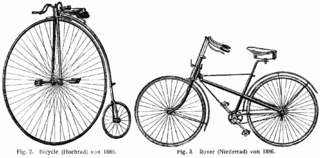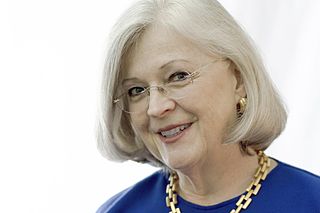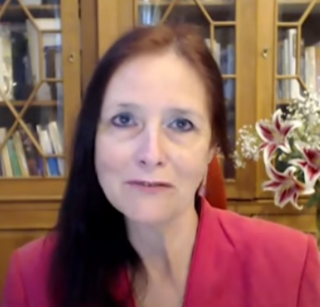
A think tank, or public policy institute, is a research institute that performs research and advocacy concerning topics such as social policy, political strategy, economics, military, technology, and culture. Most think tanks are non-governmental organizations, but some are semi-autonomous agencies within a government, and some are associated with particular political parties, businesses, or the military. Think tanks are often funded by individual donations, with many also accepting government grants.

In business theory, disruptive innovation is innovation that creates a new market and value network or enters at the bottom of an existing market and eventually displaces established market-leading firms, products, and alliances. The term, "disruptive innovation" was popularized by the American academic Clayton Christensen and his collaborators beginning in 1995, but the concept had been previously described in Richard N. Foster's book Innovation: The Attacker's Advantage and in the paper "Strategic responses to technological threats", as well as by Joseph Schumpeter in the book Capitalism, Socialism and Democracy.
Transparency International e.V. (TI) is a German registered association founded in 1993 by former employees of the World Bank. Based in Berlin, its nonprofit and non-governmental purpose is to take action to combat global corruption with civil societal anti-corruption measures and to prevent criminal activities arising from corruption. Its most notable publications include the Global Corruption Barometer and the Corruption Perceptions Index. TI serves as an umbrella organization. From 1993 to today, its membership has grown from a few individuals to more than 100 national chapters, which engage in fighting perceived corruption in their home countries. TI is a member of G20 Think Tanks, UNESCO Consultative Status, United Nations Global Compact, Sustainable Development Solutions Network and shares the goals of peace, justice, strong institutions and partnerships of the United Nations Sustainable Development Group (UNSDG). TI is a social partner of Global Alliance in Management Education. TI confirmed the dis-accreditation of the national chapter of United States of America in 2017.

Innovation is the practical implementation of ideas that result in the introduction of new goods or services or improvement in offering goods or services. ISO TC 279 in the standard ISO 56000:2020 defines innovation as "a new or changed entity, realizing or redistributing value". Others have different definitions; a common element in the definitions is a focus on newness, improvement, and spread of ideas or technologies.
Management consulting is the practice of providing consulting services to organizations to improve their performance or in any way to assist in achieving organizational objectives. Organizations may draw upon the services of management consultants for a number of reasons, including gaining external advice and accessing consultants' specialized expertise regarding concerns that call for additional oversight.
Technology transfer (TT), also called transfer of technology (TOT), is the process of transferring (disseminating) technology from the person or organization that owns or holds it to another person or organization, in an attempt to transform inventions and scientific outcomes into new products and services that benefit society. Technology transfer is closely related to knowledge transfer.
Macmillan Publishers is a British publishing company traditionally considered to be one of the "Big Five" English language publishers. Founded in London in 1843 by Scottish brothers Daniel and Alexander MacMillan, the firm soon established itself as a leading publisher in Britain. It published two of the best-known works of Victorian-era children's literature, Lewis Carroll's Alice's Adventures in Wonderland (1865) and Rudyard Kipling's The Jungle Book (1894).
Peter Lewyn Bernstein was an American financial historian, economist and educator whose evangelizing of the efficient-market hypothesis to the public made him one of the country's best known popularizers of academic finance.

Atlas Network, formerly known as Atlas Economic Research Foundation, is a non-governmental 501(c)(3) organization based in the United States that provides training, networking, and grants for libertarian, free-market, and conservative groups around the world.

Social entrepreneurship is an approach by individuals, groups, start-up companies or entrepreneurs, in which they develop, fund and implement solutions to social, cultural, or environmental issues. This concept may be applied to a wide range of organizations, which vary in size, aims, and beliefs. For-profit entrepreneurs typically measure performance using business metrics like profit, revenues and increases in stock prices. Social entrepreneurs, however, are either non-profits, or they blend for-profit goals with generating a positive "return to society". Therefore, they use different metrics. Social entrepreneurship typically attempts to further broad social, cultural and environmental goals often associated with the voluntary sector in areas such as poverty alleviation, health care and community development.

Stephen "Steve" Goldsmith is an American politician and writer who was the 46th mayor of Indianapolis. He also served as the deputy mayor of New York City for operations from 2010 to 2011. A member of the Republican Party, he ran unsuccessfully for lieutenant governor of Indiana in 1988 and governor of Indiana in 1996. He is currently the Derek Bok Professor of the Practice of Urban Policy and Director of Data-Smart City Solutions at the John F. Kennedy School of Government at Harvard University. In 2006, Goldsmith was elected as a fellow of the National Academy of Public Administration.

Monitor Deloitte is the multinational strategy consulting practice of Deloitte Consulting. Monitor Deloitte specializes in providing strategy consultation services to the senior management of major organizations and governments. It helps its clients address a variety of management areas, including: Organic Growth, Strategic Transformation, Innovation and Ventures, Business Design and Configuration, Strategic Sensing, and Insight Services.

The RAND Corporation is an American nonprofit global policy think tank, research institute, and public sector consulting firm. RAND Corporation engages in research and development (R&D) in a number of fields and industries. Since the 1950s, RAND research has helped inform United States policy decisions on a wide variety of issues, including the space race, the Vietnam War, the U.S.-Soviet nuclear arms confrontation, the creation of the Great Society social welfare programs, and national health care.
A Sivathanu Pillai is an Indian scientist who formerly served as Honorary Distinguished Professor at Indian Space Research Organisation (2015–2018) and an honorary professor at IIT Delhi in the Department of Mechanical Engineering (2015–2016) and a visiting professor at Indian Institute of Science (2014–2015).

Manufacturing USA, previously known as the National Network for Manufacturing Innovation, is a network of research institutes in the United States that focuses on developing manufacturing technologies through public-private partnerships among U.S. industry, universities, and federal government agencies. Modeled similar to Germany's Fraunhofer Institutes, the network currently consists of 16 institutes. The institutes work independently and together on a number of advanced technologies.

Andrew Paul McAfee is a principal research scientist at MIT and cofounder and codirector of the MIT Initiative on the Digital Economy at the MIT Sloan School of Management. He studies how digital technologies are changing the world.
The Manhattan Institute for Policy Research is an American 501(c)(3) nonprofit conservative think tank focused on domestic policy and urban affairs. The institute's focus covers a wide variety of issues including healthcare, higher education, public housing, prisoner reentry, and policing. It was established in Manhattan in 1978 by Antony Fisher and William J. Casey.

Lorraine Eden is Professor Emerita of Management in the Mays Business School of Texas A&M University, College Station, Texas. She also holds a joint appointment as a research professor in the Texas A&M School of Law. Dr. Eden is an expert in the field of International Transfer Pricing, which is the pricing of products that move between subunits of Multinational Enterprises (MNEs).

Research Policy is a monthly peer-reviewed academic journal published by Elsevier on behalf of the Science Policy Research Unit. It was established by British economist Christopher Freeman in 1971 and is regarded as the leading journal in the field of innovation studies. It is listed as one of the 50 journals used by the Financial Times to compile its business-school research ranks.

Kay Firth-Butterfield is a lawyer, professor, and author specializing in the intersection of artificial intelligence, international relations, Business and AI ethics. She is the CEO of the Centre for Trustworthy Technology which is a Member of the World Economic Forum's Forth Industrial Revolution Network. Before starting her new position Kay was the head of AI and machine learning at the World Economic Forum. She was an adjunct professor of law at the University of Texas at Austin.













